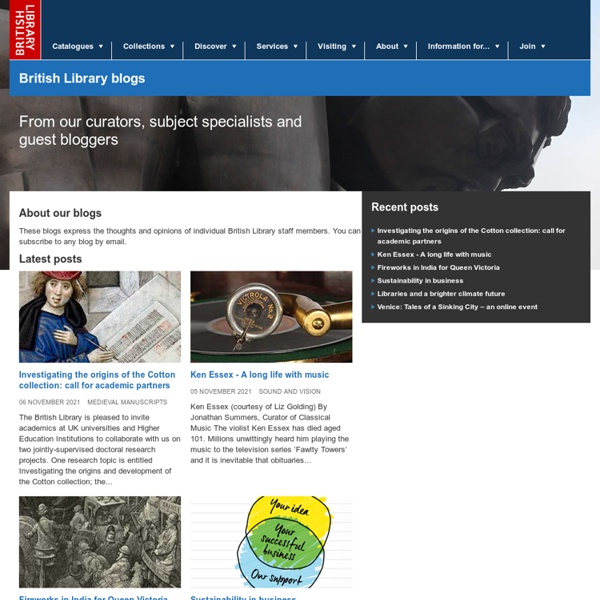



Sport and Society Blog Simone Bacchini writes: It sometimes feels like the case for sport as a vehicle for social change is a bit overstated. Yet, the announcement that London has bid to host the 2018 Gay Games ( might be, well, a game changer. The Gay Games was started in San Francisco, in 1982. Sporting events for minority groups, some of them facing varying degrees of discrimination have a double function. Sport is one of the favourite arenas in which socially approved norms of gender behaviour are displayed, learned, and reinforced. Obviously, for many LGBT people sport has never been an issue: they simply aren’t interested. The Paralympics has been an important tool in changing views of and attitudes towards disability. References Journal of Homosexuality. London Reference Collection: SPIS Journals Display (open access) Anderson, E. (2009). General Reference Collection: SPIS306.7662 (open access) Symons, C. (2010). Document Supply: m11/.11320
Americas Collections Blog As a historian I get very excited about old letters, diaries, account books and inventories – but once in a while there are other ‘records’ that trump almost everything else. I had one of those moments this week when I returned to George Washington’s Mount Vernon. Over the past six years I have been many times to Washington’s estate in Virginia (just south of Washington DC) – first to research my book Founding Gardeners and then to give talks about the book. By now I go there to see the changes in the gardens (of which there are many, such as the fabulous restoration of the Upper Garden) and to meet my friend Dean Norton who is the Director of Horticulture there. Last Wednesday’s visit, however, was one of the most memorable. Mount Vernon’s Pecan before it was taken down (photo by Dean Norton) Dean explained to me that they had finally decided to take down the tree because it threatened the house. It took four days to take the giant down – with a crane. Click here to see the film.
ALA TechSource ALA TechSource, an imprint of the American Library Association, publishes Library Technology Reports and Smart Libraries Newsletter. Library Technology Reports, published in eight issues annually, helps librarians make informed decisions about technology products and projects. Reports are authored by experts in the field and may address the application of technology to library services, provide thorough overviews of library technology, offer evaluative descriptions of specific products or product classes, or cover emerging technology. Smart Libraries Newsletter, published monthly, offers Marshall Breeding’s news and analysis on products, vendors, and new developments in the library automation marketplace. Subscribers receive timely coverage of significant events about library technology products and organizations. Print subscriptions include access to digital versions. To subscribe, view our subscription pricing and offerings page!
Editor's blog live: Day two of the CIPD conference Charlie Duff with her highlights of the CIPD conference for Wednesday 18 November 2009 Yesterday and today have been extremely busy but it's been a great experience for me to meet lots of people and members, plus potential members and contributors. I'm already looking forward to tomorrow but wanted to share with you the highlights from today. Yesterday I asked on Twitter a question sparked by Andrea Cartwright of Nationwide. This morning was full of insight from a masterclass in going beyond employee engagement. Speaking of happiness, The Rough Guide to Happiness was gifted to us today. He finished by imploring us to 'dance with life in the close hold embrace and don't let anything get in the way of that'. A guide to using social media was very popular this afternoon and made the point that it's not just for Gen Y. Roger Steare's talk about integrity in business was highly ethical and value-driven giving delegates the benefit of his knowledge.
Organising Chaos Sound Recordings Blog Cheryl Tipp, Natural Sounds Curator writes: Over the past 5 weeks, listeners of BBC Radio 4 have been treated to a series dedicated entirely to sound and its many roles in human culture over the past 100,000 years. Noise: a Human History, written and presented by Professor David Hendy and made in collaboration with the British Library's Sound Archive, has explored a multitude of subjects, from the power of great orators to the significance of resonant spaces. Episode 25, Capturing Sound, looks at new technologies that emerged during the latter half of the 19th Century, making it possible to record and thereby transform sound from something previously transient and elusive. The British Library has an extensive collection of both early recordings and the equipment used to record and playback these sounds. Edison Home Phonograph (1900) Don Bradman, Australian cricketer - How it's Done Amy Johnson, pioneer aviator - The Story of my Flight Franklin D.
Untold Lives Continuing with the series on William Henry Fox Talbot (1800-1877), we look here at his lifelong interest in botany and some of the items now available to researchers through the British Library catalogue. Botany was one of Talbot’s favourite fields of study although he pursued it only as an occasional interest. Nevertheless he was extremely knowledgeable and held in high regard. In 1829 he was elected to the prestigious Linnean Society, today one of the oldest active botanical societies in the world. Talbot was also a member of the Horticultural Society of London, the Royal Botanic Society of London, and the Botanical Society of Edinburgh. From the age of 14, Talbot maintained a lively correspondence with eminent botanists such as Lewis Weston Dillwyn (1778-1855) and Sir William Jackson Hooker (1785-1865), and later with Reverend James Dalton (1764-1843). MS 88942/1/364 Detail of Talbot’s note on seeds sent to him by his nephew, Lieutenant Colonel Charles Edgcumbe (1838-1915)
The Embedded Librarian | Exploring New, Embedded Roles for Librarians in Organizations of All Types